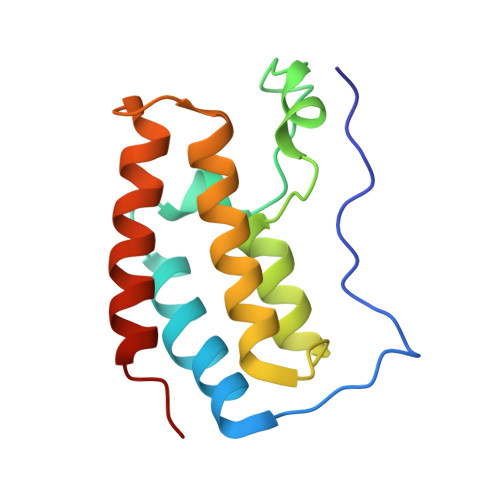Characterization of a dual BET/HDAC inhibitor for treatment of pancreatic ductal adenocarcinoma.
Zhang, X., Zegar, T., Weiser, T., Hamdan, F.H., Berger, B.T., Lucas, R., Balourdas, D.I., Ladigan, S., Cheung, P.F., Liffers, S.T., Trajkovic-Arsic, M., Scheffler, B., Joerger, A.C., Hahn, S.A., Johnsen, S.A., Knapp, S., Siveke, J.T.(2020) Int J Cancer 147: 2847-2861
- PubMed: 32599645
- DOI: https://doi.org/10.1002/ijc.33137
- Primary Citation of Related Structures:
6YQN, 6YQO, 6YQP - PubMed Abstract:
Pancreatic ductal adenocarcinoma (PDAC) is resistant to virtually all chemo- and targeted therapeutic approaches. Epigenetic regulators represent a novel class of drug targets. Among them, BET and HDAC proteins are central regulators of chromatin structure and transcription, and preclinical evidence suggests effectiveness of combined BET and HDAC inhibition in PDAC. Here, we describe that TW9, a newly generated adduct of the BET inhibitor (+)-JQ1 and class I HDAC inhibitor CI994, is a potent dual inhibitor simultaneously targeting BET and HDAC proteins. TW9 has a similar affinity to BRD4 bromodomains as (+)-JQ1 and shares a conserved binding mode, but is significantly more active in inhibiting HDAC1 compared to the parental HDAC inhibitor CI994. TW9 was more potent in inhibiting tumor cell proliferation compared to (+)-JQ1, CI994 alone or combined treatment of both inhibitors. Sequential administration of gemcitabine and TW9 showed additional synergistic antitumor effects. Microarray analysis revealed that dysregulation of a FOSL1-directed transcriptional program contributed to the antitumor effects of TW9. Our results demonstrate the potential of a dual chromatin-targeting strategy in the treatment of PDAC and provide a rationale for further development of multitarget inhibitors.
Organizational Affiliation:
Institute for Developmental Cancer Therapeutics, West German Cancer Center, University Medicine Essen, Essen, Germany.
















